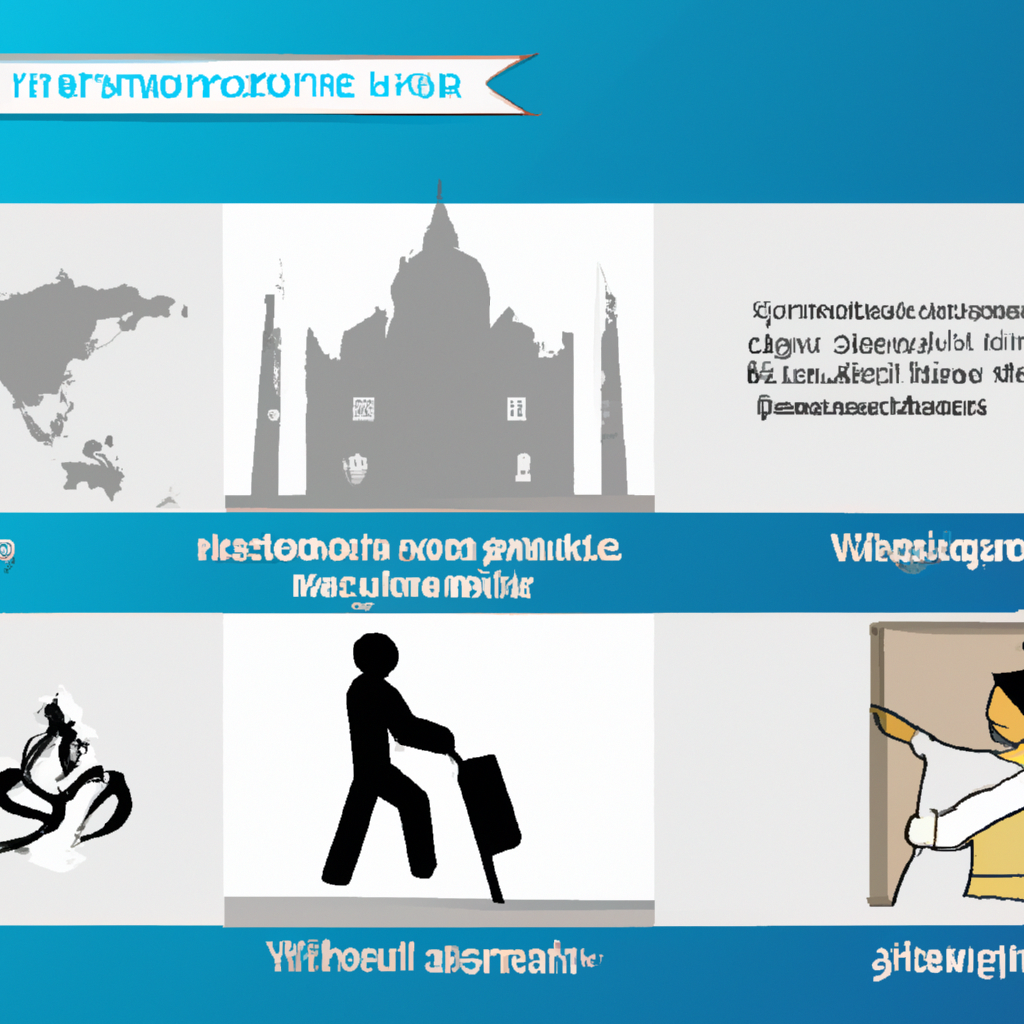
How Do I Handle Emergencies Or Natural Disasters While Abroad?
Whether you’re embarking on an exciting international adventure or a necessary business trip, the thought of facing an emergency or natural disaster while abroad can be daunting. However, with proper preparation and a calm mindset, you can effectively handle these unexpected situations. From knowing local emergency numbers to creating an emergency contact plan, this article will provide you with practical tips and advice to ensure your safety and peace of mind while navigating through unfamiliar territory.
Planning and Preparation
Research and Understand Local Emergency Procedures
Before traveling to a new destination, it is crucial to research and understand the local emergency procedures. Each country or region may have different protocols in place, and being aware of them can help you stay safe during emergencies. Take the time to familiarize yourself with evacuation procedures, emergency shelter locations, and any specific guidelines or regulations related to natural disasters or other emergencies.
Purchase Travel Insurance
Travel insurance is an essential aspect of your trip preparation, especially when it comes to emergencies. It provides coverage for unforeseen events such as medical emergencies, trip cancellations, or lost belongings. Look for comprehensive travel insurance plans that offer coverage for emergency medical expenses, including evacuation or repatriation. Having travel insurance in place will give you peace of mind knowing that you are financially protected in case of any unforeseen emergencies.
Register with Local Authorities
Before your trip, consider registering with the local authorities or embassy of your home country. This registration helps ensure that you can receive timely information and assistance during emergencies. In some countries, registering with the embassy may also be a mandatory requirement. By providing your contact information and travel details, you enable the authorities to reach out to you and provide necessary support during unforeseen events.
Create an Emergency Contact List
Creating an emergency contact list is essential for staying prepared in any situation. Include important contact numbers such as local emergency services, your embassy or consulate, your travel insurance provider, and your emergency contacts back home. Keep a printed copy of this list with you at all times, and also store it digitally on your phone or other devices. Having these contact details readily accessible can save precious time during emergencies.
Learn Basic First Aid and CPR
Being familiar with basic first aid and CPR (Cardiopulmonary Resuscitation) can make a significant difference in emergency situations. Consider enrolling in a first aid and CPR course before your trip or refresh your knowledge if you have already taken such a course. Learning how to handle common medical emergencies and provide initial assistance can be lifesaving. Carry a compact first aid kit that includes essential supplies such as bandages, antiseptic wipes, and pain relievers.
Staying Informed
Stay Updated on Local News and Alerts
Staying informed about local news and alerts is crucial during your trip, particularly in unfamiliar surroundings. Regularly check local news sources, such as newspapers, television channels, or radio stations, to stay updated on any developments or warnings related to natural disasters or emergencies. Pay attention to weather forecasts and advisories, as they can help you make informed decisions about your activities and stay safe.
Sign up for Travel Safety Alerts
Many countries provide travel safety alerts to keep tourists informed about potential risks and emergencies. Check with your home country’s government or embassy for any available services that provide safety alerts for travelers. By signing up for these alerts, you can receive timely information about security threats, natural disasters, or civil unrest in your travel destination. These alerts will help you make necessary adjustments to your itinerary and stay safe.
Download Relevant Smartphone Apps
In today’s digital age, smartphone apps can be invaluable in providing information and assistance during emergencies. Before your trip, research and download relevant apps that can help you in different situations. These can include weather apps, emergency communication apps, translation apps, and mapping apps. Some countries may have local apps specifically designed for emergency situations, so exploring the options specific to your destination can be extremely beneficial.
Identify Emergency Exit Routes
Regardless of where you stay during your trip, it is important to identify emergency exit routes. This applies to hotels, vacation rentals, or even public spaces like shopping centers or public transportation stations. Familiarize yourself with the layout of the building or area, locate the emergency exits, and understand the evacuation procedures. Knowing your surroundings and potential exit routes can aid in a quick escape during emergencies.
Emergency Communication
Keep Important Documents and Contacts Accessible
During emergencies, having important documents and contacts readily accessible is crucial. Keep copies of your passport, identification, and travel insurance policy in a secure place such as a travel document organizer or a password-protected digital folder. Additionally, ensure that you have contact details for local authorities, your embassy or consulate, and your travel insurance provider easily accessible. Having these documents and contacts accessible will help streamline the communication process during emergencies.
Bring a Reliable Communication Device
Having a reliable communication device is essential during emergencies. Ensure that you have a fully charged smartphone with a local SIM card or international roaming activated. In areas with limited cellular coverage, consider carrying a satellite phone or a portable Wi-Fi hotspot device. These devices can help you stay connected and call for assistance when necessary. Keep in mind that different countries may have different network providers, so check the compatibility of your device before traveling.
Understand Local Communication Infrastructure
Understanding the local communication infrastructure of your destination is important for effective communication during emergencies. Research the available communication networks, such as cellular coverage, internet connectivity, and public Wi-Fi hotspots. This knowledge will help you determine the most reliable means of communication in different situations. It is also advisable to have alternative communication methods in case of network disruptions, such as two-way radios or offline messaging applications.
Know How to Use Local Emergency Hotlines
Every country has its own emergency hotline, and knowing how to use it can be vital in emergencies. Before your trip, find out the emergency hotline number of your destination and store it in your phone’s contacts. It is also essential to understand how the local emergency hotline functions. In some countries, dialing the emergency number may connect you directly with emergency services, while in others, it may connect you to a central dispatch center. Understanding the process will help you provide accurate information and get the necessary assistance promptly.
Safety and Security Measures
Follow Local Authorities’ Instructions
During emergencies, it is crucial to follow the instructions of local authorities. They have the knowledge and resources to guide you through the situation safely. Pay attention to official announcements, updates, and evacuation orders. If local authorities advise you to move to a safer location, do so without hesitation. Cooperating with their instructions will greatly increase your chances of staying safe and minimizing risks during emergencies.
Assess the Risks and Avoid Dangerous Locations
When traveling abroad, it is essential to assess the risks associated with your destination and avoid dangerous locations. Research the safety situation of the country or area you plan to visit, including any ongoing conflicts, civil unrest, or high crime rates. Stay informed about potential risks and follow travel advisories issued by your home country’s government. It is best to avoid areas where there is an increased chance of natural disasters, political unrest, or severe crime.
Stay Vigilant and Aware of Your Surroundings
Maintaining vigilance and being aware of your surroundings can help you avoid potential hazards and respond appropriately during emergencies. Pay attention to the people around you, observe any changes in the environment, and be alert to any signs of danger. If something feels off or unsafe, trust your instincts and take necessary precautions. Being proactive and vigilant can help you stay one step ahead and react quickly in case of emergencies.
Travel with a Buddy System, if Possible
Traveling with a buddy or in a group can provide an extra layer of safety and security. If possible, find a travel companion to explore your destination together. In times of emergencies, having someone to rely on can be incredibly beneficial. Your buddy can assist you in seeking help, providing support, and making important decisions. Additionally, traveling in a group can deter potential criminals and make you less of a target.
Secure Valuables and Important Documents
Safeguarding your valuables and important documents is crucial while traveling, especially during emergencies. Use a secure travel wallet or passport holder to keep your identification, credit cards, and cash safe. If you are staying in accommodations, utilize safes or lockboxes to store your valuables when you are not carrying them. Consider making digital copies of important documents and saving them in a secure cloud storage account. By securing your belongings and documents, you can minimize potential losses and expedite recovery if necessary.
Natural Disaster Preparedness
Research Potential Natural Disasters in the Area
Different regions of the world are prone to various natural disasters, such as hurricanes, earthquakes, wildfires, or floods. Before visiting a particular area, research the potential natural disasters that could occur there. Understand the seasons or periods when these disasters are more likely to happen. This knowledge will enable you to better prepare and adapt your travel plans accordingly. Stay updated on any early warning systems established by the local authorities to receive timely information.
Know the Evacuation Routes and Shelters
In areas prone to natural disasters, knowing the evacuation routes and designated shelters is crucial. Research the primary evacuation routes and familiarize yourself with alternative routes in case of closures or congestion. Identify the locations of designated shelters or emergency centers where you can seek refuge during a natural disaster. Remember that local authorities may provide specific instructions during emergencies, so follow their guidance regarding evacuation and sheltering.
Prepare an Emergency Kit
Having an emergency kit is essential during natural disasters. Pack a kit with essential items such as non-perishable food, drinking water, a flashlight, extra batteries, a first aid kit, a whistle, a portable phone charger, and a waterproof bag to protect important documents. Customize your emergency kit according to the potential risks of the area you are visiting. It is recommended to have enough supplies for at least 72 hours to sustain you until help arrives or normalcy is restored.
Establish a Communication Plan with Loved Ones
Before traveling, establish a communication plan with your loved ones so that they know how to reach you and vice versa during emergencies. Share your itinerary, accommodation details, and contact information with them. Determine a point of contact who can relay information to the rest of your loved ones if communication networks are disrupted. Agree on a method of communication, such as regular check-ins or specific phrases if you need to convey distress. Regular communication will provide reassurance and streamline assistance if needed.
Medical Emergencies
Research Local Medical Facilities and Services
Prior to your trip, research the local medical facilities and services available in your destination. Identify hospitals, clinics, or emergency rooms that provide reliable healthcare services. Consider the quality of care available and the proximity to your accommodation. If you have specific medical needs or conditions, ensure that the necessary specialists or facilities are accessible in case of emergencies.
Carry Essential Medications and Prescription Information
If you rely on essential medications, make sure to carry an adequate supply for the duration of your trip. Keep these medications in their original packaging with clear labels to avoid any confusion or issues with customs. Additionally, carry a copy of your prescriptions or a letter from your healthcare provider explaining the need for the medications. This documentation will be useful in case of any questions or emergencies that arise during your travels.
Know How to Seek Medical Assistance
In the event of a medical emergency, it is crucial to know how to seek medical assistance in your destination. Familiarize yourself with the emergency medical services, such as the local emergency hotline or ambulance services. If the situation is not life-threatening, consider visiting a nearby clinic or hospital for immediate medical attention. Be prepared to provide necessary information, such as your travel insurance details and any existing medical conditions, to the healthcare professionals.
Contact Your Travel Insurance Provider
In case of any medical emergencies, contact your travel insurance provider as soon as possible. Inform them about the situation and provide all the necessary details, including any medical treatments or expenses incurred. Follow their instructions regarding seeking medical assistance or hospital admissions, as they may have partnership arrangements with specific medical facilities. Keep copies of all relevant documentation, including medical reports and bills, for insurance claims later on.

Evacuation Procedures
Obey Evacuation Orders
During emergencies that require evacuation, it is crucial to obey evacuation orders issued by local authorities. These orders are put in place to ensure the safety of individuals in high-risk areas. If evacuation is recommended or mandatory, follow the instructions promptly. Do not delay or underestimate the severity of the situation. Evacuating in a timely manner can help you avoid potential risks and access necessary support services efficiently.
Pack Necessary Belongings
When faced with an evacuation order, pack necessary belongings swiftly and efficiently. Focus on essentials such as identification documents, travel documents, medications, personal hygiene items, a change of clothing, and any valuable or sentimental items that can be carried easily. A pre-packed emergency bag with these items can save precious time. Additionally, consider packing emergency supplies such as food, water, and a portable phone charger in case you encounter delays or disruptions during evacuation.
Follow Designated Evacuation Routes
To ensure a smooth and safe evacuation process, follow the designated evacuation routes designated by local authorities. These routes are carefully planned to maximize safety and avoid potential hazards or congested areas. Pay attention to road signs, instructions from emergency personnel, and any updates provided through official channels. Stay informed about road conditions and any potential obstacles or closures that may affect your planned route.
Stay Informed about Transportation Options
During emergencies, transportation options may be limited or disrupted. Stay informed about alternative transportation options available for evacuation, such as buses, trains, or boats designated for emergency purposes. Understand any limitations or requirements for accessing evacuation transportation, such as pre-registration or specific assembly points. Being aware of the available transportation options will help you make informed decisions and ensure a timely evacuation if necessary.
Notify Embassy or Consulate, if Applicable
If you are a citizen of a foreign country traveling abroad, it is essential to notify your embassy or consulate about the emergency or potential evacuation. Embassies and consulates can provide support and assistance during emergencies, including updated information, evacuation coordination, and communication with your home country. Registering with your embassy or consulate before your trip will facilitate a faster response if you require their help during an emergency situation.
Coping with Emergencies
Remain Calm and Stay Positive
In any emergency, it is crucial to remain calm and maintain a positive mindset. Panicking or becoming overwhelmed will hinder your ability to think clearly and take necessary actions. Take deep breaths, reassess the situation, and remind yourself that help is available. Staying calm will not only help you make better decisions but also reassure those around you, fostering a more efficient response to the emergency.
Assess the Situation and Prioritize Safety
Evaluate the situation objectively and assess potential risks before taking any actions. Prioritize your safety and the safety of those around you. Consider the nature and severity of the emergency to determine the most appropriate course of action. Be flexible and adaptable, as plans may need to change based on evolving circumstances. Always err on the side of caution and take preventive measures to mitigate risks when possible.
Gather Necessary Supplies and Resources
During emergencies, gather necessary supplies and resources to ensure your comfort and well-being. This includes food, water, clothing, blankets, and any essential medications or medical supplies. If you are in a temporary shelter, follow any instructions provided by the emergency response team and make use of the available resources. Conserve your resources, especially if there is uncertainty about the duration of the emergency or the availability of assistance.
Maintain Regular Communication with Loved Ones
Communication with your loved ones is crucial during emergencies. Regularly update them on your situation, share your location if possible, and inform them about any changes or developments. This will alleviate their concerns and provide them with essential information to assist you if needed. Utilize phone calls, text messages, or social media platforms to maintain communication. However, keep in mind that limited network availability or power outages may affect communication capabilities, so plan alternative communication methods if necessary.
Emergency Financial Preparedness
Keep Emergency Cash Accessible
Having emergency cash readily available is essential during emergencies, especially if banking services or ATMs are not accessible. Carry a sufficient amount of cash in local currency to cover immediate needs such as transportation, food, and accommodation. Ensure that the denominations are small to facilitate transactions. It is advisable to keep emergency cash in a concealed location within your travel luggage or on your person, but separate from your wallet or purse.
Have Multiple Payment Methods
As a backup to cash, it is advisable to have multiple payment methods available. Carry at least one major credit card that is widely accepted. Additionally, consider having a prepaid travel card loaded with funds that can be used in case of emergencies. Distribute your payment methods among different locations to reduce the risk of losing all your financial resources at once. Be aware of the contact information for your financial institutions in case you need to report lost or stolen cards.
Inform Your Bank or Credit Card Company
Notify your bank or credit card company about your travel plans, especially when visiting foreign destinations. Inform them of the countries you will be visiting and the duration of your trip to avoid any unexpected issues with your accounts. Some financial institutions may impose restrictions or put a hold on your accounts if they notice suspicious activity from an unfamiliar location. By providing advance notice, you can prevent any inconvenience during emergencies.
Make Copies of Important Financial Documents
Make copies of important financial documents such as credit card numbers, bank account information, and traveler’s checks. Keep a set of copies in a secure location, separate from the originals. In case of loss or theft of your cards or other financial instruments, these copies can serve as a reference for reporting and recovery procedures. Having a backup of your financial documents will streamline the process of canceling cards, obtaining replacements, or filing insurance claims if necessary.
Post-Emergency Actions
Contact Your Embassy or Consulate
After an emergency or natural disaster, it is vital to contact your embassy or consulate to inform them about your situation and seek necessary support. They can provide guidance on the next steps, arrange for necessary assistance, or connect you with local sources of support and aid. If you have registered with your embassy or consulate before your trip, they will already have your information on file, facilitating a smoother process.
Document your Experience and Losses
Documenting your experience and losses is crucial when dealing with emergencies or natural disasters abroad. Take photographs or videos of any damages, injuries, or losses incurred. Make detailed notes about the sequence of events and any relevant information surrounding the situation. Keep all receipts, bills, or documentation related to any expenses or losses you have incurred. This documentation will be useful when filing insurance claims or seeking compensation later on.
Seek Local Assistance and Support
After an emergency, local assistance and support can be invaluable in navigating the recovery process. Reach out to local authorities, emergency response organizations, or nonprofit groups that provide assistance to affected individuals. They can offer guidance on emergency relief efforts, provide access to temporary shelters or supplies, and offer resources or counseling for coping with the aftermath of the emergency. Utilize the available local support systems to help in your recovery.
Follow up with Insurance Claims or Compensation
If you have travel insurance, it is essential to follow up with your provider regarding any claims or compensation. Submit all the necessary documentation, including photographic evidence, copies of receipts, and any other required forms. Keep a record of your communication with the insurance company, including dates of contact and the names of the representatives you speak with. Be patient during the claims process, as it may take time to assess the damages and process your claim, but be persistent in following up until it is resolved.
Handling emergencies and natural disasters while abroad can be a stressful and challenging experience. However, with proper planning, preparation, and knowledge of the local protocols and resources, you can increase your safety and minimize the impact of such situations. By staying informed, maintaining effective communication, prioritizing safety, and seeking assistance when necessary, you can navigate through emergencies with resilience and confidence, ultimately ensuring your well-being while traveling.







